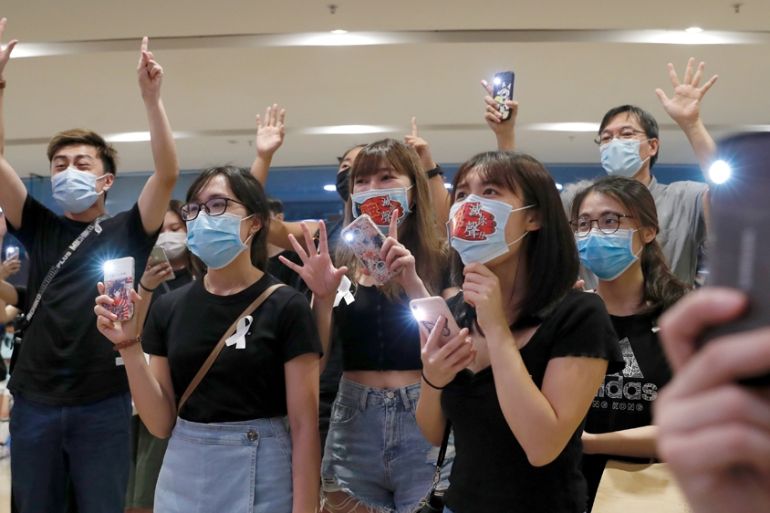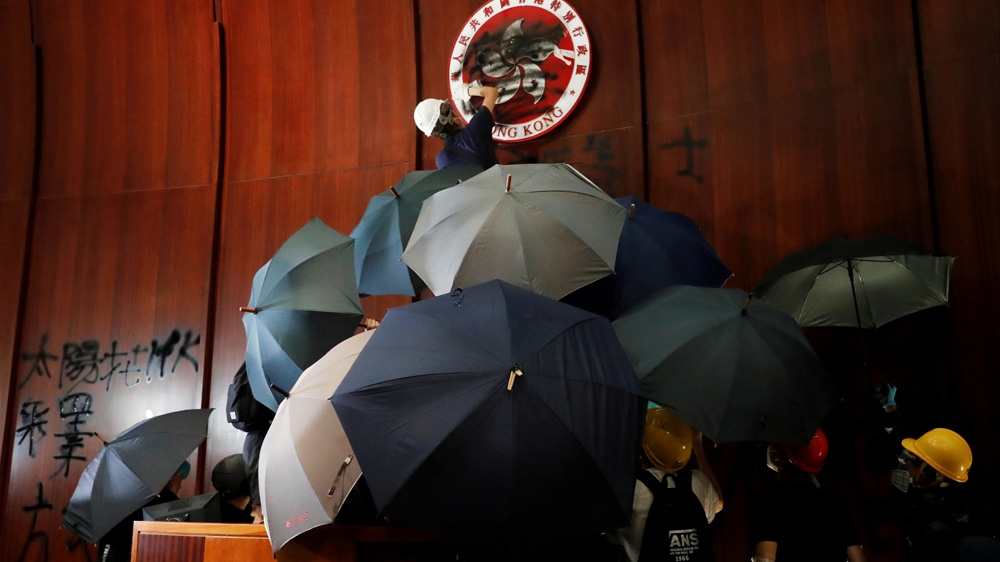G7 urges China not to impose national security law on Hong Kong
Foreign ministers’ statement comes on eve of key parliamentary meeting and as Pompeo and Yang meet in Hawaii.

Foreign ministers from the G7 are calling on China to drop plans to impose national security legislation on Hong Kong that they said would put the system that had allowed the territory to flourish at risk, as officials prepared to meet in Beijing to thrash out the details of the legislation.
In a joint statement, the ministers said China’s decision to impose the law was “not in conformity” with either the Hong Kong Basic Law, the territory’s mini-constitution, or its obligations under the “legally-binding, UN-registered” Sino-British Joint Declaration.
Keep reading
list of 3 itemsHK’s Carrie Lam says security law opponents ‘enemy of the people’
86 groups urge China to scrap Hong Kong national security law
Hong Kong was a British colony for more than 150 years before it was returned to China in 1997 under a framework that allowed its people rights and freedoms, including an independent judiciary, unknown elsewhere on the mainland.
“The proposed national security law would risk seriously undermining the ‘One Country, Two Systems’ principle and the territory’s high degree of autonomy,” the foreign ministers of United States, Canada, France, Germany, Italy, Japan, the United Kingdom, and the EU’s High Representative said in the statement, which was issued late on Wednesday.
“We strongly urge the Government of China to re-consider this decision,” it said.
Pompeo-Yang meeting
China’s National People’s Congress agreed to impose the legislation on Hong Kong at its meeting last month, in a move that has drawn criticism from civil society, investors, pro-democracy groups and some governments.

The details of the law are being drafted by the NPC’s Standing Committee, which is meeting in Beijing until June 20, but China said earlier it would ban all activities labelled secession, subversion, terrorism and foreign interference, and would allow mainland security agencies to set up operations in the territory.
Officials in Hong Kong and Beijing say the planned law would strengthen governance and target only a small number of “troublemakers” who threaten national security.
The dispute over the legislation has further damaged relations between China and the US, with the two countries already at loggerheads over trade, the coronavirus pandemic and China’s treatment of ethnic Uighur people in its far western region of Xinjiang.
US Secretary of State Mike Pompeo met China’s top diplomat, Yang Jiechi, in Hawaii on Wednesday, the first known contact between the two men since a phone call about coronavirus back on April 15. They last met in person in August last year.
Pompeo has been particularly forceful in his criticism of Beijing. As they were due to meet US President Donald Trump signed into law a bill that calls for sanctions on Chinese officials responsible for oppressing the Uighurs, including on one of Yang’s colleagues on China’s powerful Politburo.
Trump tempered that possibility with a signing statement saying that some of the bill’s sanctions requirements might limit his constitutional authority as president to conduct diplomacy so he would regard them as advisory rather than mandatory.
At the same time, Trump and his administration are fending off damning accusations by his former national security adviser, John Bolton, that the president sought Chinese President Xi Jinping’s help to win re-election during a closed-door June 2019 meeting.
|
|
The US government this week sued to prevent Bolton from publishing the book containing the allegations, arguing it contained classified information and would compromise national security.
The White House did not immediately respond to a request for comment on Wednesday’s published excerpts.
Neither the US nor China has outlined an agenda for the Hawaii talks, but diplomats and other sources have said the meeting was requested by Beijing. Arms-control talks and Hong Kong were set to be discussed, according to a report in Voice of America.
Trump has initiated a process of eliminating special US treatment for Hong Kong to punish China for curbing freedoms there, but has stopped short of immediately ending the trading privileges that have helped the territory remain a global financial centre.